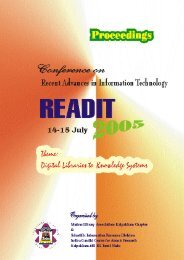READIT - 2009 - Indira Gandhi Centre for Atomic Research
READIT - 2009 - Indira Gandhi Centre for Atomic Research
READIT - 2009 - Indira Gandhi Centre for Atomic Research
You also want an ePaper? Increase the reach of your titles
YUMPU automatically turns print PDFs into web optimized ePapers that Google loves.
Proceedings of <strong>READIT</strong>-<strong>2009</strong>, Kalpakkam - 603 102, 29-30 Dec <strong>2009</strong><br />
“Directories,” which maintain ordered lists of websites provide e.g. Yahoo similar services!<br />
www.liv.ac.uk/webteam/glossary/<br />
A tool or program, which allows keyword searching <strong>for</strong> relevant sites or in<strong>for</strong>mation on<br />
the Internet. General and topic-specific search engines are prevalent today, <strong>for</strong> example,<br />
Education World, WebCrawler, Info seek, Lycos, and Yahoo are examples of search engines.<br />
www.education-world.com/help/glossary.shtml<br />
HOW DOES SEARCH ENGINES WORK?<br />
Search engine databases are selected and built by computer robot programs called<br />
spiders. Although it is said they "Crawl" the web in their hunt <strong>for</strong> pages to include, in truth<br />
they stay in one place. They find the pages <strong>for</strong> potential inclusion by following the links in the<br />
pages they already have in their database (i.e., already "know about"). They cannot think or<br />
type a URL or use judgment to "decide" to go look something up and see what's on the web<br />
about it. (Computers are getting more sophisticated all the time, but they are still brainless.)<br />
After spiders find pages, they pass them on to another computer program <strong>for</strong><br />
"indexing." This program identifies the text, links, and other content in the page and stores it in<br />
the search engine database's files so that the database can be searched by keyword and<br />
whatever more advanced approaches are offered, and the page will be found if your search<br />
matches its content.<br />
SEMANTIC WEB SEARCH ENGINES:<br />
Unlike traditional search engines, which crawl the Web gathering Web pages, Semantic<br />
Web search engines index RDF data stored on the Web and provide an interface to search<br />
through the crawled data. Below is a list of Semantic Web search engines that are currently<br />
under development. Semantic Search engines are:<br />
1. SEMANTIC WEB SEARCH ENGINE (SWSE): is a search engine <strong>for</strong> the RDF Web<br />
on the Web, and provides the equivalent services a search engine currently provides <strong>for</strong><br />
the HTML Web. The system explores and indexes the Semantic Web and provides an<br />
easy-to-use interface through which users can find the in<strong>for</strong>mation they are looking <strong>for</strong>.<br />
Because of the inherent semantics of RDF and other Semantic Web languages, the<br />
search and in<strong>for</strong>mation retrieval capabilities of SWSE are potentially much more<br />
powerful than those of current search engines.<br />
109<br />
2

















